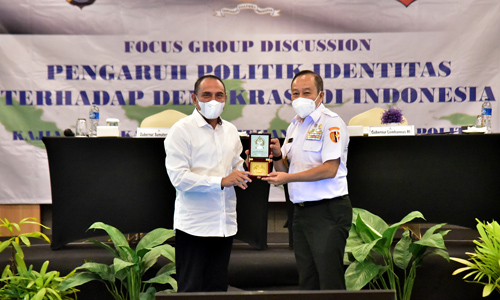Politics and decision making are two inseparable elements that have a direct impact on our lives. The decisions made by political leaders influence the society and the public in numerous ways. It is important to understand the significance of responsible political decision making, and the role it plays in promoting harmony and progress in a society.
Reputasi Sumut Tekan Konflik Jadi
The importance of political identity and decision making was recently discussed by two governors for the betterment of Sumut. Reputasi Sumut Tekan Konflik Jadi, the article highlights how politics and its image can influence the public perception and eventually lead to conflicts in the society. Sumut, being a diverse province in Indonesia, is home to many ethnic groups, religions, and languages. As such, there is a great potential for conflicts to arise when political decisions are made with no regard to the diversity of the population.
It is crucial for political leaders to keep the interests of all groups in mind while making decisions, to promote peace, and avoid conflicts. The article suggests that politicians must work towards creating constructive politics, keeping in mind the diverse identities that make up the society. Only through responsible decision making can a peaceful society be created without compromising the beliefs and values of the people.

What is Political Ethic?
Political ethic refers to a set of principles and values that guide political decision making in an ethical and responsible manner. It involves making decisions that are in the best interest of the society as a whole, while also being mindful of the individual groups that make up the society. The main focus of political ethic is to ensure justice, equality, and fairness for all members of the society.
Why is Political Ethic Important?
Political ethic is important because it ensures that political decisions are made in a responsible, fair, and just manner. When political leaders make decisions keeping in mind the welfare of all members of the society, it helps to promote peace, stability, and prosperity. Political ethic plays a crucial role in promoting transparency, accountability, and good governance.
Benefits of Political Ethic
The benefits of political ethic are many and varied. Some of the key benefits include:
- Promotes responsible decision making
- Ensures good governance
- Prevents conflicts and disharmony in the society
- Promotes transparency and accountability
- Helps to build trust and confidence in the political system
Ideas for Promoting Political Ethic
There are many ways in which political ethic can be promoted. Some ideas include:
- Ensuring that political leaders undergo regular training on ethical decision making
- Encouraging citizens to actively participate in the political process
- Promoting transparency and accountability in the political system
- Encouraging political leaders to prioritize the welfare of all members of the society, not just a particular group
- Creating a culture of ethical decision making in the political system
How to Implement Political Ethic?
Implementing political ethic requires a concerted effort from all stakeholders in the political system. Some steps that can be taken include:
- Creating a code of conduct for political leaders
- Ensuring that political leaders undergo regular training on ethical decision making
- Promoting transparency and accountability in the political system
- Encouraging citizens to actively participate in the political process
- Establishing an independent body to investigate and monitor the conduct of political leaders
Tips for Promoting Political Ethic
Finally, here are some tips for promoting political ethic:
- Encourage and support political leaders who prioritize ethical decision making
- Use social media and other platforms to raise awareness about the importance of political ethic
- Engage in constructive dialogue with political leaders to promote ethical decision making
- Participate actively in the political process to promote transparency and accountability
- Organize public forums and debates on ethical decision making in politics
Pengaruh Politik Etis Bagi Bangsa Indonesia
The impact of political ethic on a society can be seen in various parts of the world, including Indonesia. The article Pengaruh Politik Etis Bagi Bangsa Indonesia discusses the significance of political ethic for promoting development and progress in the country. The article highlights the role of political leaders in creating an ethical and democratic political environment that promotes trust and confidence in the political system.

What is Local Culture?
Local culture refers to the traditional beliefs, customs, values, and practices of a particular group or society. It is the foundation of a society’s identity and plays an important role in shaping the way people think, act, and interact. Local culture encompasses a wide range of aspects including language, food, music, dance, festivals, and art.
Why is Identifying Local Culture Important?
Identifying and preserving local culture is important because it helps to promote diversity and tolerance in the society. Local culture serves as a source of pride for people, and helps to reinforce their cultural identity. It is also a means of celebrating the unique characteristics of a particular group or society, and can promote tourism and economic growth.
Benefits of Identifying Local Culture
The benefits of identifying local culture are many and varied. Some of the key benefits include:
- Promotes cultural diversity
- Helps to preserve traditional knowledge and practices
- Serves as a source of pride and identity for people
- Helps to promote tourism and economic growth
- Promotes tolerance and understanding between different groups and societies
Ideas for Identifying Local Culture
There are many ways in which local culture can be identified and celebrated. Some ideas include:
- Organizing cultural festivals and events to showcase local culture
- Encouraging the teaching of local languages and traditions in schools
- Supporting local artists and craftsmen
- Promoting traditional food, music, and dance
- Encouraging the collection and preservation of historical artifacts and documents
How to Identify Local Culture?
Identifying local culture requires a deep understanding and appreciation of the unique characteristics of a particular group or society. Some steps that can be taken include:
- Conducting research on the historical and cultural background of a particular group or society
- Interviewing local experts and elders to learn about traditional practices and beliefs
- Visiting museums and historical sites
- Participating in cultural events and festivals
- Exploring the local food, music, and art scenes
Tips for Identifying Local Culture
Finally, here are some tips for identifying local culture:
- Be open-minded and respectful when exploring different cultures
- Take time to learn and appreciate the unique characteristics of a particular group or society
- Seek out local experts and organizations to learn about local customs and traditions
- Participate in cultural events and celebrations
- Take an active interest in learning about the history and heritage of a particular group or society
Pengertian Pengambilan Keputusan dan Pentingnya Peran Pengambil Keputusan
Pengambilan keputusan adalah suatu proses yang dilakukan oleh individu atau kelompok untuk memilih alternatif yang paling tepat dalam situasi tertentu. Hal ini penting karena keputusan yang dibuat dapat memiliki dampak besar pada kehidupan seseorang atau kelompok. Peran pengambil keputusan adalah sangat penting dalam dunia politik karena keputusan yang dibuat oleh para pemimpin politik dapat mempengaruhi seluruh masyarakat.

What is the Role of Decision Makers?
The role of decision makers is to identify and evaluate alternative courses of action, and choose the best option based on careful analysis and consideration. Decision makers must take into account a wide range of factors including the needs and wants of stakeholders, the impact of the decision on the society, and the risks and benefits of each option.
Why is the Role of Decision Makers Important?
The role of decision makers is important because it helps to ensure that the decisions made are in the best interest of the society as a whole. Decision makers must be accountable for their actions and decisions, and must take into account the diverse needs and interests of the society. If decision makers fail to perform their role responsibly, it can lead to conflict, mistrust, and disharmony in the society.
Benefits of Effective Decision Making
The benefits of effective decision making are numerous. Some of the key benefits include:
- Promotes peace and harmony in the society
- Ensures that resources are utilized effectively and efficiently
- Helps to promote economic growth and development
- Promotes transparency and accountability in the political system
- Ensures that the needs and wants of all members of the society are met
Ideas for Effective Decision Making
There are many ways in which effective decision making can be promoted. Some ideas include:
- Encouraging the use of data and evidence-based analysis in decision making
- Creating a transparent and accountable decision-making process
- Encouraging public participation and engagement in decision-making
- Providing decision-makers with training and support in ethical decision-making
- Encouraging a culture of ethical decision-making in the society
How to Make Effective Decisions?
Making effective decisions requires a careful analysis of the situation, weighing the pros and cons, and choosing the best option based on the available information. Some steps that can be taken include:
- Identifying the problem or issue that needs to be addressed
- Identifying and evaluating the alternative courses of action
- Assessing the risks and benefits of each option
- Choosing the best option based on the available information
- Implementing the decision and monitoring its impact
Tips for Effective Decision Making
Finally, here are some tips for effective decision making:
- Involve all stakeholders in the decision-making process
- Be transparent and accountable in the decision-making process
- Use data and evidence-based analysis in decision making
- Consider the impact of the decision on the society as a whole
- Prioritize the needs and wants of all members of the society, not just a particular group
Peran Pengambil Keputusan dalam Keterlambatan Rujukan Maternal
Peran pengambil keputusan sangat penting dalam mengatasi keterlambatan rujukan maternal, yaitu situasi di mana seorang ibu hamil mengalami komplikasi yang memerlukan perawatan segera, namun penanganan medis ditunda-tunda. Situasi ini dapat berdampak serius pada kesehatan ibu dan bayi, dan dapat menjadi penyebab kematian dalam banyak kasus.

What is Maternal Referral Delay?
Maternal referral delay refers to the situation where a pregnant woman experiences complications that require urgent medical care, but medical attention is delayed. Maternal referral delay can have serious consequences for the health of the mother and the baby, and can even be fatal in some cases.
Why is the Role of Decision Makers Important in Maternal Referral Delay?
The role of decision makers is crucial in preventing maternal referral delay. Decision makers must ensure that pregnant women have access to timely and appropriate medical care, and that there are no delays in the referral and treatment process. If decision makers fail to take appropriate action, it can lead to serious consequences for the health of the mother and the baby.
Benefits of Timely Referral for Maternal Care
The benefits of timely referral for maternal care are many and varied. Some of the key benefits include:
- Prevents serious complications and mortality
- Promotes the health and wellbeing of both the mother and the baby
- Ensures that pregnant women have access to quality medical care
- Promotes trust and confidence in the healthcare system
- Helps to reduce the burden on healthcare facilities and staff
Ideas for Preventing Maternal Referral Delay
There are many ways in which maternal referral delay can be prevented. Some ideas include:
- Improving access to quality maternal healthcare services
- Training and educating healthcare workers on the importance of timely referral and treatment of maternal complications
- Establishing referral systems and protocols for pregnant women requiring emergency medical care
- Strengthening the infrastructure and resources of healthcare facilities to ensure that pregnant women receive appropriate care
- Encouraging pregnant women to seek medical care at the earliest signs of complications
How to Prevent Maternal Referral Delay?
Preventing maternal referral delay requires a concerted effort from all stakeholders in the healthcare system. Some steps that can be taken include:
- Establishing effective referral systems and protocols for pregnant women requiring emergency medical care
- Training and educating healthcare workers on the importance of timely referral and treatment of maternal complications
- Ensuring that healthcare facilities have the necessary infrastructure and resources to provide quality maternal healthcare services
- Conducting regular monitoring and evaluation of the maternal healthcare system to identify areas for improvement
- Encouraging pregnant women to seek medical care at the earliest signs of complications
Tips for Preventing Maternal Referral Delay
Finally, here are some tips for preventing maternal referral delay:
- Ensure that all pregnant women have access to quality maternal healthcare services
- Establish effective referral systems and protocols for pregnant women requiring emergency medical care
- Train and educate healthcare workers on the importance of timely referral and treatment of maternal complications
- Conduct regular monitoring and evaluation of the maternal healthcare system to identify areas for improvement
- Encourage pregnant women to seek medical care at the earliest












